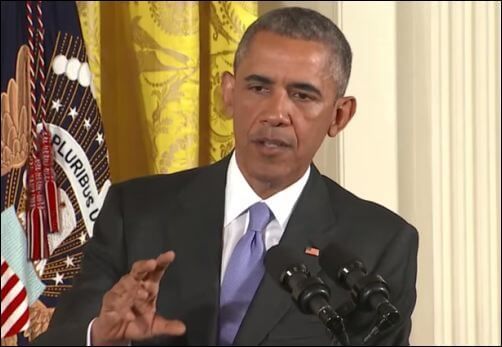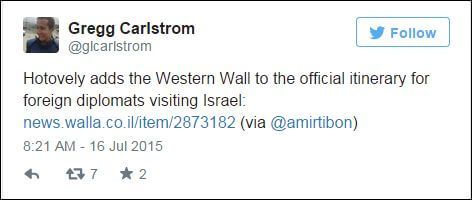Today’s Top Stories
1. The scrutiny and spin games continue as White House sells Iran deal. See below for all the news and commentary.

2. According to documents leaked by Edward Snowden, Israeli special forces were responsible for the 2008 assassination of Brigadier General Mohammed Suleiman.
“We’ve had access to Israeli military communications for some time,” said one of the former U.S. intelligence officers . . .
Brig. Gen. Suleiman was a top military and intelligence adviser to Syrian leader Bashar al-Assad, and was suspected of being behind the Syrian government’s efforts to facilitate Iran’s provision of arms and military training to Hezbollah in neighboring Lebanon. Suleiman was also reported to have been in charge of the security and construction of Syria’s Al Kibar nuclear facility, which Israel destroyed in a 2007 air attack. The NSA document described part of Suleiman’s responsibilities as “sensitive military issues.”
3. Israel and Hamas discussing deal for Gaza captives
The sources confirmed Hamas’s recent statement to the effect that Mengistu, who crossed the border in September, is in Hamas captivity but is nevertheless safe and sound. The organization’s new stance on Mengistu contrasts with its previous version, according to which the Israeli man had crossed into Egypt via a tunnel. Hamas officials, however, refused to comment on the matter during a conversation with The Times of Israel.
4. The Real Crisis of Zionism: Must Zionism – the ideology that asserts the Jewish right to a state in Israel – be avoided when speaking to people about Israel?
Israel and the Palestinians
• An Israeli air strike hit “terrorist infrastructure” in Gaza after Palestinians fired a rocket last night. The rocket landed in an open area near Ashkelon causing no damage.
• If you want to understand where this development is coming from, I suggest you see coverage of Tzipi Hotovely’s inaugural speech to Foreign Ministry employees (and Jeff Jacoby‘s take). The Western Wall’s going to become a de rigeuer visit for visiting world leaders.
• Jerusalem Post: Diplomats from the Quartet (US, Russia, EU and UN) met in Amman to discuss “how to create conditions that will enable the parties to return to meaningful negotiations.”
• Qalandiya refugee camp: A ‘chaotic base for terror’
• Why are Palestinians quitting their medical studies in Venezuela? AP did some digging:
But the students who dropped out complain that their first year consisted only of Spanish language lessons and indoctrination about Venezuela’s 16-year-old socialist revolution. They say they were surprised when their teachers presented a curriculum centered on community health and worried when doctors from other institutions warned that their education wouldn’t meet international standards.
• At the Kerem Shalom crossing between Israel and Gaza, Holland’s Foreign Minister inaugurated a new security scanner expected to boost the number of trucks bringing materials to the strip. Dutch and Israeli officials told the Associated Press that 1,000 trucks will be able to cross daily, up from the current 600.
• Though Gaza needs to reconstruct homes, Turkey’s to build a 20,000 seat stadium named after President Erdogan.
Iranian Atomic Urgency
• Likud and Labor leaders are quietly “discussing” a national unity government. At the moment, according to Haaretz, President Reuven Rivlin has been acting as a go-between for several weeks. All the rest is rumors and politics . . .
• According to the New York Times, the White House wants to boost military aid packages to Israel as a consolation. But Bibi’s not biting,
. . . one aide suggested in a phone call to Jewish and pro-Israel groups that Mr. Netanyahu had rebuffed their overtures because he believes accepting them now would be tantamount to blessing the nuclear deal, say people involved in the call who did not want to be quoted by name in describing it.
Meanwhile, the Jerusalem Post elaborates on the defense benefits likely to be discussed when US Secretary of Defense Ashton Carter visits Israel next week.
• White House adviser Ben Rhodes told CNN the US never sought “anytime, anywhere access” to Iranian sites. More at the Times of Israel.
• The US is already circulating a draft Security Council resolution endorsing the Iran deal. Getting UN approval for the accord before Congress finishes debating it is a heckuva way to engineer a fait accompli, as Foreign Policy points out.
Under the terms of a U.S. law passed this year, lawmakers can prevent the president from lifting congressional sanctions on Iran, which would blow up the landmark nuclear deal.
However, if a resolution is approved by the Security Council early next week, any president, Democrat or Republican, would be legally bound to enforce its terms.
• Netanyahu and Hammond spar over Iran nuclear deal at joint press conference
• Turns out the nuclear accord contains no reference to the Parchin facility and places no restrictions on the Bushehr facility.
• President Obama held a press conference to answer questions about the deal. Here’s the full video and transcript.
• Israeli officials continued speaking out against the accord. Prime Minister Netanyahu appeared on NBC News, ABC News, CBS News, and National Public Radio. Cabinet minister Naftali Bennett appeared on BBC. And Bibi’s point man on Iran, Yuval Steinitz briefed reporters.
Commentary/Analysis
• It’s bad enough the US bungled the nuclear negotiations. Now, President Obama and British Foreign Minister Philip Hammond and London are “are now compounding their failure by peddling a false narrative about Israel.” But, as David Horovitz lays out, it’s all based on the false assumption that A) Israel wanted war, and B) there was no better agreement to be had.
To see ourselves being misrepresented and unjustly criticized by disingenuous leaders as this tragedy plays out, as we in Israel brace to battle against the repercussions of their insistent incompetence, is a contemptible case of adding insult to looming injury.
• According to Eli Lake, the accords amount to a US exit strategy from the Mideast.
Maybe the real benefit, at least from Obama’s perspective, is that the nuclear deal will pave the way for America’s full exit from the Middle East. After more than a decade of war and nation-building, the region is less stable and more dangerous than it was on 9/11. The Atlantic’s Peter Beinart, who supports the deal, says what its critics are really doing is “blaming Obama for the fact that the United States is not omnipotent.” Perhaps we have reached the limits of what American leadership can do in that part of the world.
But if that’s true, Obama should have the decency to level with us about it. This deal is not an affirmation of American leadership. It’s a recognition of American exhaustion.
• Unleashed economic forces will make Iran deal unenforceable:
Iran provides Western Europe and China with an alternative to Russian natural gas.
Boeing, French oil company Total and German industry group BDI see vast opportunities in the Iran market, and the surge of European, Chinese and American investment into Iran will be reminiscent of the Gold Rush that created modern California.
Once those euros, yuan and dollars are in, political pressures will make it tough to re-impose western economic sanctions.
• Here’s what else I’m reading today . . .
– Ari Shavit: Five reasons to worry about the Iran deal
– Efraim Inbar: Six strikes against the nuclear deal
– Mordechai Kedar: The end of an era
– Toby Greene: What does Iran want with all that enriched uranium?
– Max Boot: The dawn of Iranian empire
– William Tobey: The nuclear inspection charade (via Google News)
– Con Coughlin: Accord grants amnesty to world’s leading terrorist mastermind
– Aaron David Miller: Is Obama building a case for the Iran deal, or undermining it?

– Matthew Kroenig: Obama abandons 70 Years of nonproliferation policy
– Ariel Ben Solomon: Iran deal to see Middle East conflicts go on steroids
– Zvi Barel: Time for US to pamper the Saudis
– Gershon Baskin: A bad agreement is better than no agreement
– Elliott Abrams: Iran got a better deal than it had a right to expect
– Peter Beinart: Face it, US and Israel don’t have same interests
– Uzi Even: Relax, Israel can live with Iran deal
– Doyle McManus: Don’t like the Iran deal? What’s the alternative?
– Leslie Gelb: The real reason Obama did the Iran deal
• Staff-eds include the Wall St. Journal (click via Google News), The Spectator, New Statesman,and Sydney Morning Herald.
Featured image: CC BY-NC flickr/Chris Yarzab with additions by HonestReporting; Snowden CC BY Wikimedia Commons/Laura Poitras/Praxis Films; Obama via YouTube/PBS NewsHour;
For more, see yesterday’s Israel Daily News Stream and join the IDNS on Facebook.


